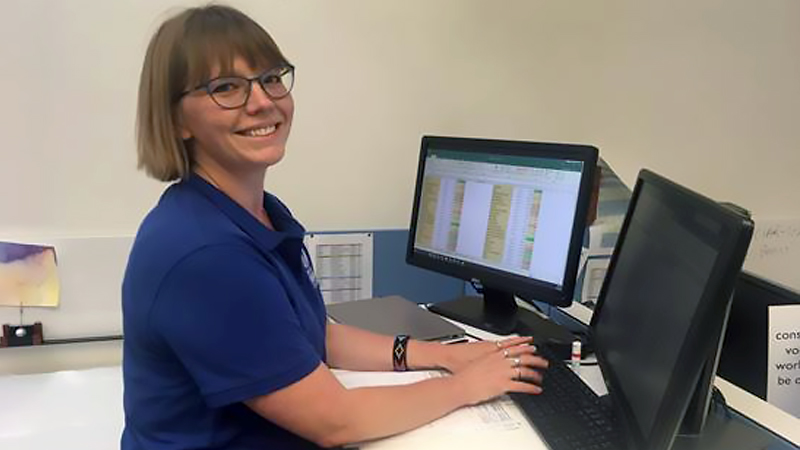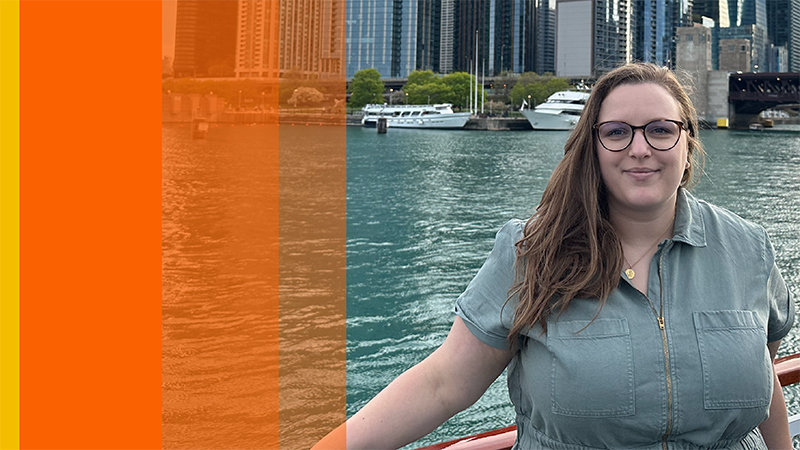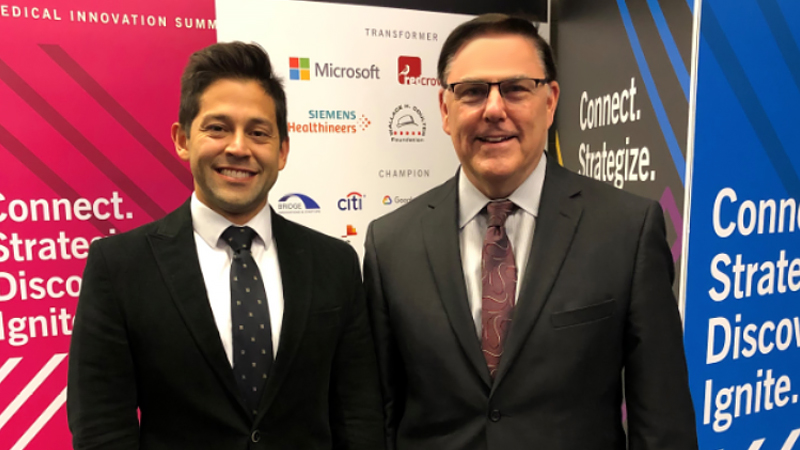RIT Research and Academic Support Leads to Ph.D. at St. Jude’s
RIT equipped Maria Smith ’18 with the hands-on research and academic support to succeed. Now she is a Ph.D. candidate at the St. Jude Graduate School of Biomedical Sciences.
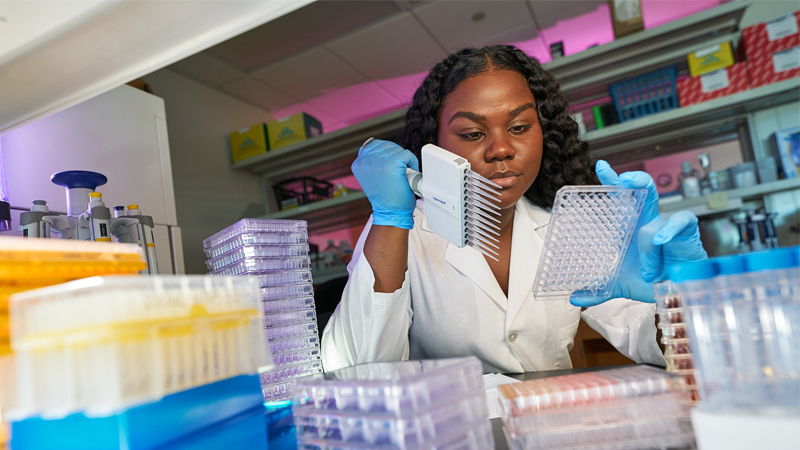
The hands-on research opportunities and academic support at RIT equipped biotechnology and molecular bioscience alum Maria Smith ’18 with a strong science background while diversifying her technical skills. Now she is a Ph.D. candidate at the St. Jude Graduate School of Biomedical Sciences, working in the Department of Infectious Diseases at the St. Jude Children’s Research Hospital.
Maria began studying scientific concepts while attending high school in the Commonwealth of Dominica, a tiny island in the Caribbean. Her exposure to laboratory work in class was limited, but a one-week internship at the only hospital on the island fostered her interest. She became fascinated by the intellectual and creative freedom used by scientists to tackle scientific investigations. “With the help of my dad, we searched for academic institutions in New York where the science curriculum was supplemented with practical lab training and basic research internships were available. During our search, we found the Biotechnology and Molecular Bioscience major at RIT, and I fell in love with how the curriculum was structured.”
Since almost all of the core science courses at RIT incorporate a mandatory laboratory component, Maria could learn fundamental lab techniques and apply them to experimental scenarios. She felt it was one of the few programs incorporating a laboratory component to complement the core science coursework. “RIT is an institution with a plethora of resources to ensure that you are well supported and excelling academically. I was pleased by the availability of research opportunities and academic support, which allowed me to put my knowledge into practice and apply them to research studies.”
While at RIT, Maria was mentored by Dr. Robert Osgood in the biomedical sciences program at the College of Health Sciences and Technology. Maria praised Dr. Osgood as a phenomenal scientist and an amazing professor who genuinely cares about the success of every one of his students. She said his enthusiasm, passion, and innate curiosity for science are contagious. “Despite my lack of experience, Dr. Osgood allowed me to work in his lab during my first year. He guided me every step of the way and taught me most of the microbiology techniques I know today. He also provided an exceptional learning and supportive working environment where I never hesitated to ask conceptual, scientific, or experimental questions. He is one of my best mentors; he truly believed in me, which helped me gain confidence in my skills and intellectual abilities as a scientist.”
To help her excel in class, Maria took full advantage of faculty office hours, teaching assistant sessions, and external course workshops. But more importantly, she also took advantage of any available resources that could help her establish a strong foundation in biological and chemical sciences.
Maria was also actively involved in the Multicultural Center for Academic Success (MCAS), which introduced her to various programs instrumental to her academic trajectory and current success. Maria was a member of the Collegiate Science Technology Entry Program, the Louis Stokes Alliance for Minority Participation Program, and the Ronald E. McNair Post-Baccalaureate Achievement Program.
“Collectively, these organizations provided the funding for me to participate in multiple research internships at RIT. Through these opportunities, I worked in the labs of Dr. Osgood and Dr. Feng Cui, the graduate director of bioinformatics at the College of Science. These internships broadened my exposure to diverse research fields, provided professional development opportunities, enhanced my science communication skills, and sparked my interest in attending graduate school.”
With the help of these programs, Maria attended eight local and national research conferences, expanding her network with other scientists and identifying institutions of interest as she transitioned into graduate school. Maria received constructive feedback on her research from this network which propelled her scientific growth. “Overall, these experiences solidified my interest in pursuing graduate research and helped me develop into a strong candidate.” Not only did MCAS provide Maria with academic support, but she also received invaluable advice, relatable insight, and unwavering support from Mr. Jonathan Ntheketha and Ms. Sharitta Gross, who inspired her tremendously. Since her family lived in the Caribbean, Maria said they provided her with a community away from home.
“Being mentored by professionals who were underrepresented minorities like myself was instrumental to my success. As a woman of color and female in science, the mentorship I received from Mr. Ntheketha and Ms. Gross inspires me to advocate for increased recruitment, participation, and representation of underrepresented minorities in STEM fields.”
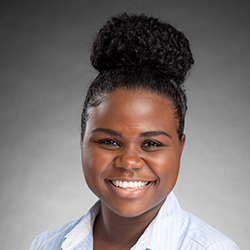 As a first-generation student, Caribbean native, and woman of color in science, Maria is passionate about promoting diversity in health-related research and careers. She is committed to the diversification of the science field to encourage the representation, empowerment, and participation of underrepresented students in this discipline. “For all my students of color – admittedly, constantly being a minority in the field can be daunting. But remember that you are more than capable, regardless of your academic, cultural, and social backgrounds. In fact, this is our superpower! Your participation and involvement in the science field will introduce unique perspectives, redefine how we think about science, and improve the quality and ingenuity of our scientific innovation and advancements.”
As a first-generation student, Caribbean native, and woman of color in science, Maria is passionate about promoting diversity in health-related research and careers. She is committed to the diversification of the science field to encourage the representation, empowerment, and participation of underrepresented students in this discipline. “For all my students of color – admittedly, constantly being a minority in the field can be daunting. But remember that you are more than capable, regardless of your academic, cultural, and social backgrounds. In fact, this is our superpower! Your participation and involvement in the science field will introduce unique perspectives, redefine how we think about science, and improve the quality and ingenuity of our scientific innovation and advancements.”
Today, Maria is a fifth-year Ph.D. candidate attending the St. Jude Graduate School of Biomedical Sciences, working in the Department of Infectious Diseases at the St. Jude Children’s Research Hospital. Her research is focused on elucidating the mechanisms at the lung epithelium that modulate host antiviral responses during influenza A virus infection. More specifically, she hopes to understand how these mechanisms suppress innate immunity and contribute fundamental knowledge to developing therapeutic interventions that can improve protection against influenza virus infection.
“I love investigating scientific unknowns and working towards addressing gaps of knowledge in the virology field. I tend to envision science as a puzzle – a field from which we have learned so much but still have so much to learn. I enjoy the challenge of designing and leading experiments to test specific hypotheses to understand these scientific unknowns better. The St. Jude Children’s Research Hospital is a phenomenal institution with state-of-art technology, unparalleled resources, and collaborative networks. Working in this environment taught me novel techniques from renowned experts, which has furthered my scientific curiosity and innovation.”
Maria recommends enrolling in undergraduate research opportunities to students interested in pursuing graduate research. She stressed that the research field is a collaborative environment and interdisciplinary collaborations are essential for advancing research studies. But while teamwork is necessary, she also said being an independent and innovative thinker is important. Being willing to learn techniques from more senior scientists while also being receptive to constructive criticism is all part of being a team player. “Graduate research involves pursuing knowledge to understand scientific unknowns. But before these unknowns can be investigated, topic conceptualization and application are imperative. As a result, self-directed learning, analytical thinking, and academic tenacity are necessary to pursue graduate-level research.”
Maria also shared insights on science communication: the ability to present work to scientists and non-scientists. She points out that it is critical to present science in a digestible manner with minimal scientific jargon so that the audience can ask questions and gain knowledge regardless of their scientific background.
"The science field is extremely broad, so it is completely understandable if you do not know exactly what field of research you are most interested in pursuing. Following the comprehensive Biotechnology and Molecular Bioscience major at RIT allowed me to learn more about my research interests while discovering new fields and identifying new interests, which helped me decide the field I would specialize in for my graduate studies."
Maria suggested students take time to identify a mentor in their field(s) of interest and never hesitate to reach out to faculty to inquire about their areas of expertise. "By learning about your mentor's trajectory, you gain insights into expectations versus the reality of the field. You also receive invaluable advice which can be applied to improve your research experience."
"Science is a challenge and can be difficult at times," Maria said. "Never forget the why. Why did you decide to become involved in scientific research? My motivation is to contribute knowledge to the field so that therapeutic treatments can be improved and developed based on this knowledge. What is your motivating factor?”









